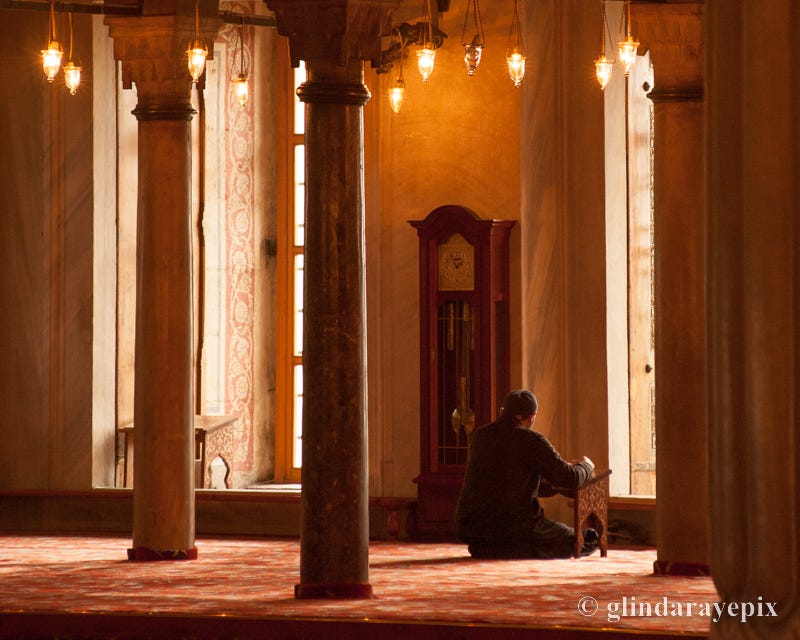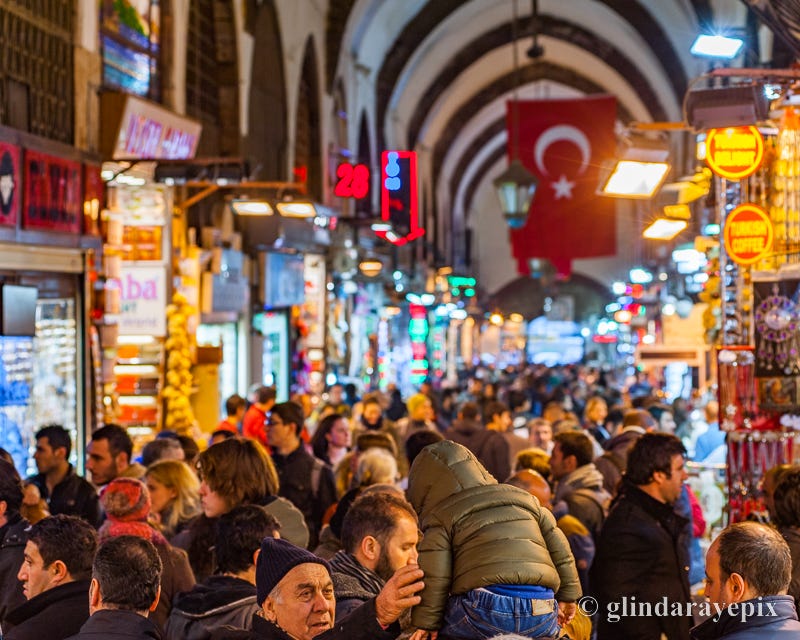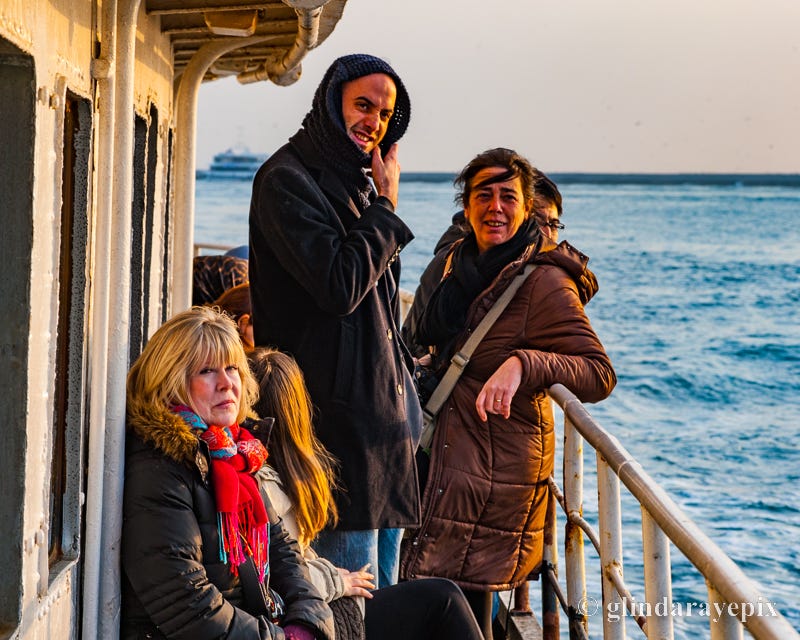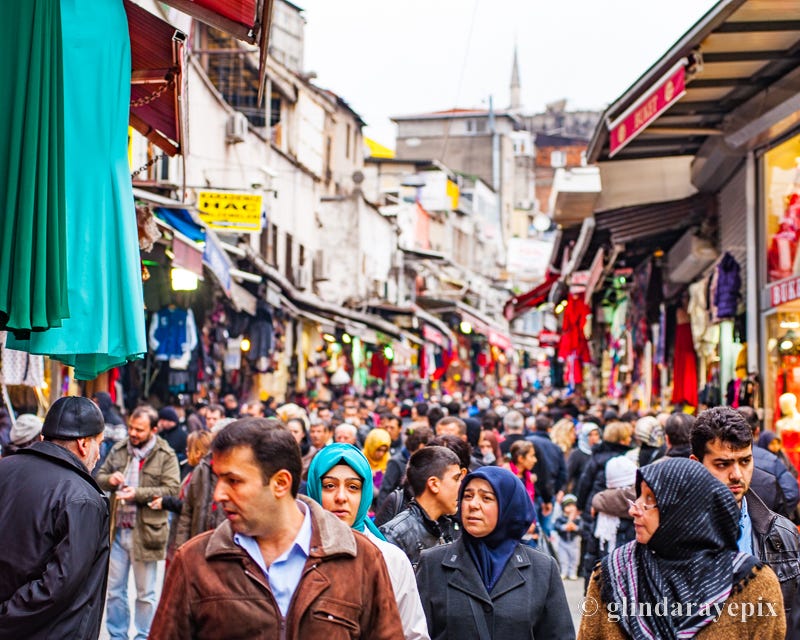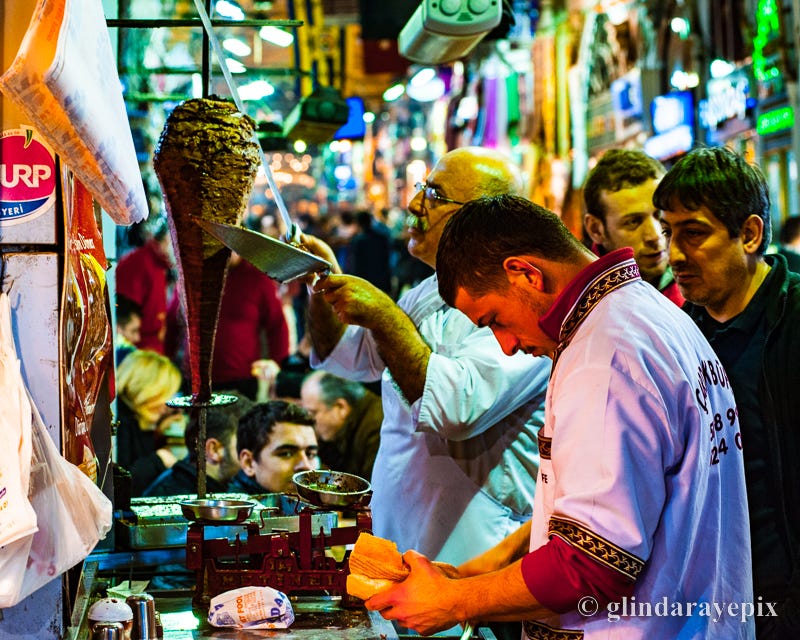It's New Year's Eve on Pera Peak, the one-time Venetian Quarter of Istanbul, and two beautiful Turkish girls in miniskirts, gaudy blouses, and five-inch heels race awkwardly down a steep street, yelling for a taxi. A group of old codgers barely glances up from their card game, but two young, male loiterers rouse from their torpor to hurl indignant insults at the scantily clad girls. The girls jeer and return the abuse, as they climb into their cab and speed away.
This is something you think about when you visit Istanbul. Pera, Galata, the business district, the university quarter, and all of the famous old palaces and mosques sit in Europe. The Greeks settled Constantinople, the Romans civilized it, and for much of its history, liberal Europeans sporadically dominated its public affairs.
After 1453, when the great Ottoman Sultans took over, they might have preached Islam, the Caliphate, and a weak Europhobia, but for the most part, they were the most tolerant and internationalist rulers of their age. And when Kemal Atatürk became the father of modern Turkey, his determined secularism set the tone for eighty years of religious and cultural tolerance.
But times do change, and in the last seventy-odd years, the lure of jobs and the big city has emptied the Anatolian countryside of millions of its underemployed youth. Today, Istanbul is a thoroughly Islamized city, with most citizens clad in headscarves, full-length sleeves, pants, and loose robes that reach the floor.
But you almost never sense the barely restrained hostility of the "Arab Street" ( it would be the "Turkish Street" here anyway, a distinction that westerners would do well to observe). In fact, one of the biggest issues of the last fifty years has been Turkey's desire to join the European Union—and its chances were torpedoed not in an intolerant alley in Istanbul, but in the governing halls of Germany.
Simply put, the "Thing" about Istanbul is that it has been around forever and has seen literally everything in the human experience.
Long before Constantinople boasted not one, but two of the most successful empires in history—the Roman-Byzantian Christians followed by the Muslim Ottomans—its position at the junction of the east-west Silk Road and the north-south Eurasia-Africa travel routes guaranteed that it would dominate the trade and culture of the ancient world. When London was still an Anglo-Saxon village and later, when Manhattan was still valued at $24 worth of beads, the polyglot city of Constantinople already teemed with travelers from the fabled four corners of the Earth.
So with all that history and the lively, chaotic activity of its modern streets, the only way we can conjure Istanbul is with an equally chaotic and random collection of observations:
The Hills:
When we pulled into Sirkeci Train Station, our first thought was to walk the 3km to our hotel. Little did we know, that the city was as hilly as San Francisco and as complicated as Hong Kong. You can reach anywhere on foot with good shoes and a half-gallon of sweat, but not with roller bags. The city boasts every kind of road and sidewalk surface except pristine.
The Names:
The Golden Horn and the Bosporus—separated at Seraglio Point across from the Galata Tower—are two of the most fabled waterways in history. The Topkapi Palace housed the Sultans, their Harems, their troops of Janissaries, and the enormous governing retinues led by their Viziers. The Hagia Sophia, the Blue Mosque, and the Süleymaniye Mosque are three leading jewels in the life of historical Islam. Legendary names like these alternately terrified and inspired generations of humanity.
The Straits:
At the junction of the Mediterranean and the Black Sea, Istanbul is a seafaring city. For all the prowess of the Ottoman armies, it was the Ottoman Navy that ruled the waves through much of history. For most of the year, the only export routes for the Russian Empire ran through the 3km-wide Bosporus. With a perfect harbor in the Golden Horn and the ships to defend it, the Ottomans were guaranteed a seat at any gathering of world powers.
The Food:
We expected the cuisine you find in Turkish cafés and restaurants all over Europe—lamb, kebabs, hummus, grape leaves, and so forth. But in an ancient city with a trading history, you find every type of food and every style of preparation on the planet. Seafood takes the prize in the restaurants, especially around the Galata Docks. Our favorite local specialty is Meze, similar to Spanish Tapas, only with a much more inventive, international touch. Waiters trawl the restaurant with stacked trays, and you point. Just save room for the (smallish) main course.
The Crowds:
Turks don't press in crowds. And it's a good thing, because anywhere you want to go, it feels like all 15 million Istanbullus want to join you.
The Bazaars:
The two oldest and most famous indoor markets in the world are the Kapali Çarşı (Grand Bazaar) and the Mısır Çarşısı (Egyptian or Spice Bazaar), both built in the 1660s. With the pressure of tourism, both have given over too much space to trinkets, but the original tenants are still there—you just have to look for them. We spent a couple of hours in a booth at the Mısır Çarşısı, sipping tea and getting an education in the wonders of Persian saffron. It only cost us a minor fortune, and we've never bought better.
The Metro:
One of our first tasks in any new city is to figure out the Metro. Our first day in Casablanca, for example, we rode the entire network, even out to the beach, and met all kinds of polite citizens determined to give up their seat for Glinda. The Istanbul Metro is far more complicated, but easy to use, and it takes you everywhere, even out to the suburbs. If you get lost like us, don't worry—just cross the tracks and go back the other way.
The Languages:
Outside the tackiest tourist traps of Fatih, you won't hear much English. In fact, you won't hear much of anything except Turkish (remember, this is a proud country with an imperial past)—especially in the docklands and working areas where we like to wander. We memorized the Turkish equivalent of "Do you speak English?", but then realized the futility of the question and switched to a more or less universal sign language. It didn't seem to inhibit anyone.
A Final Thought:
Go to Istanbul, and go soon while things are still friendly. We wish we'd followed the same advice for Teheran, Beirut, Damascus, or Baghdad—but what can you do? Today, traveling to Istanbul is traveling into the very heart of human civilization.







